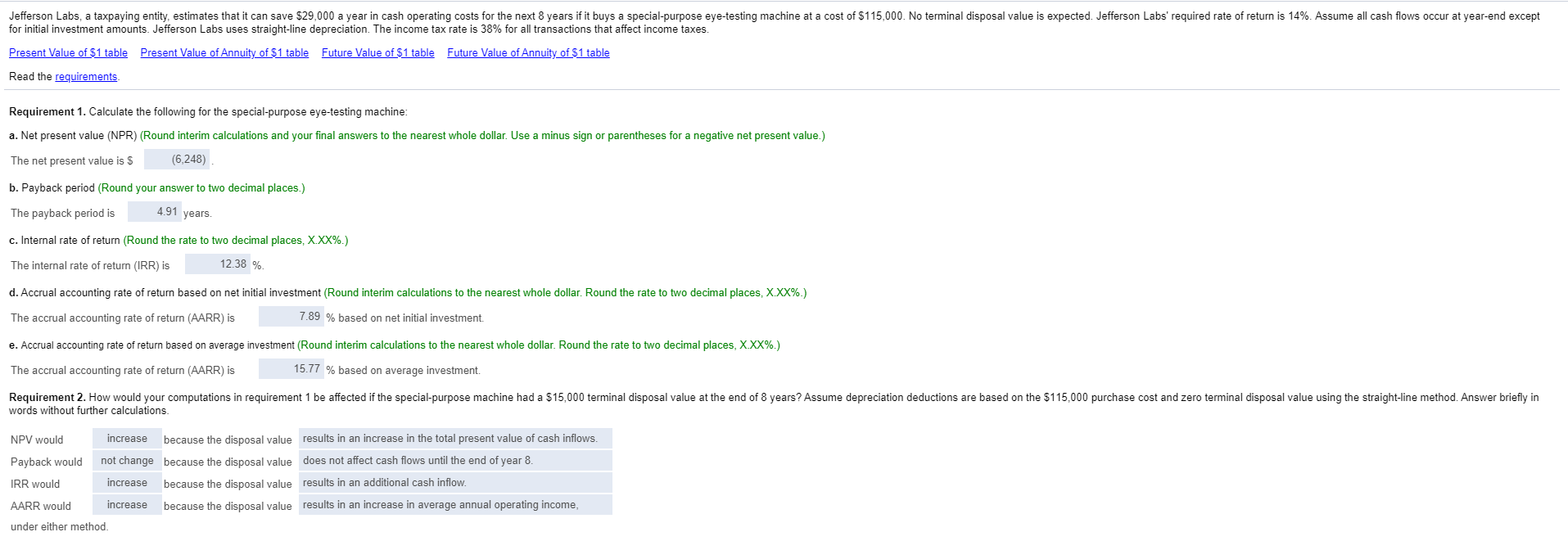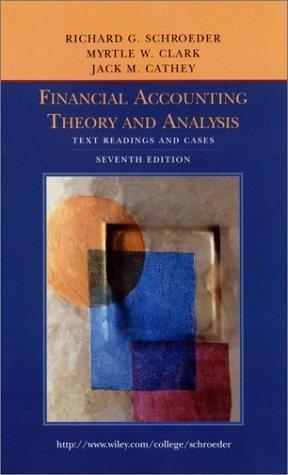I have answer , but I don't know how to solve it . Please show work to help me understand

Jefferson Labs, a taxpaying entity, estimates that it can save $29,000 a year in cash operating costs for the next 8 years if it buys a special-purpose eye-testing machine at a cost of $115,000. No terminal disposal value is expected. Jefferson Labs' required rate of return is 14%. Assume all cash flows occur at year-end except for initial investment amounts. Jefferson Labs uses straight-line depreciation. The income tax rate is 38% for all transactions that affect income taxes. Present Value of $1 table Present Value of Annuity of $1 table Future Value of $1 table Future Value of Annuity of $1 table Read the requirements Requirement 1. Calculate the following for the special-purpose eye-testing machine: a. Net present value (NPR) (Round interim calculations and your final answers to the nearest whole dollar. Use a minus sign or parentheses for a negative net present value.) The net present value is $ (6,248) b. Payback period (Round your answer to two decimal places.) The payback period is 4.91 years. c. Internal rate of return (Round the rate to two decimal places, X.XX%.) The internal rate of return (IRR) is 12.38 % d. Accrual accounting rate of return based on net initial investment (Round interim calculations to the nearest whole dollar. Round the rate to two decimal places, X.XX%.) The accrual accounting rate of return (AARR) is 7.89 % based on net initial investment. e. Accrual accounting rate of return based on average investment (Round interim calculations to the nearest whole dollar. Round the rate to two decimal places, X.XX%.) The accrual accounting rate of return (AARR) is 15.77 % based on average investment. Requirement 2. How would your computations in requirement 1 be affected if the special-purpose machine had a $15,000 terminal disposal value at the end of 8 years? Assume depreciation deductions are based on the $115,000 purchase cost and zero terminal disposal value using the straight-line method. Answer briefly in words without further calculations. NPV would increase because the disposal value results in an increase in the total present value of cash inflows. Payback would not change because the disposal value does not affect cash flows until the end of year 8. IRR would increase because the disposal value results in an additional cash inflow. AARR would increase because the disposal value results in an increase in average annual operating income, under either method. Jefferson Labs, a taxpaying entity, estimates that it can save $29,000 a year in cash operating costs for the next 8 years if it buys a special-purpose eye-testing machine at a cost of $115,000. No terminal disposal value is expected. Jefferson Labs' required rate of return is 14%. Assume all cash flows occur at year-end except for initial investment amounts. Jefferson Labs uses straight-line depreciation. The income tax rate is 38% for all transactions that affect income taxes. Present Value of $1 table Present Value of Annuity of $1 table Future Value of $1 table Future Value of Annuity of $1 table Read the requirements Requirement 1. Calculate the following for the special-purpose eye-testing machine: a. Net present value (NPR) (Round interim calculations and your final answers to the nearest whole dollar. Use a minus sign or parentheses for a negative net present value.) The net present value is $ (6,248) b. Payback period (Round your answer to two decimal places.) The payback period is 4.91 years. c. Internal rate of return (Round the rate to two decimal places, X.XX%.) The internal rate of return (IRR) is 12.38 % d. Accrual accounting rate of return based on net initial investment (Round interim calculations to the nearest whole dollar. Round the rate to two decimal places, X.XX%.) The accrual accounting rate of return (AARR) is 7.89 % based on net initial investment. e. Accrual accounting rate of return based on average investment (Round interim calculations to the nearest whole dollar. Round the rate to two decimal places, X.XX%.) The accrual accounting rate of return (AARR) is 15.77 % based on average investment. Requirement 2. How would your computations in requirement 1 be affected if the special-purpose machine had a $15,000 terminal disposal value at the end of 8 years? Assume depreciation deductions are based on the $115,000 purchase cost and zero terminal disposal value using the straight-line method. Answer briefly in words without further calculations. NPV would increase because the disposal value results in an increase in the total present value of cash inflows. Payback would not change because the disposal value does not affect cash flows until the end of year 8. IRR would increase because the disposal value results in an additional cash inflow. AARR would increase because the disposal value results in an increase in average annual operating income, under either method







